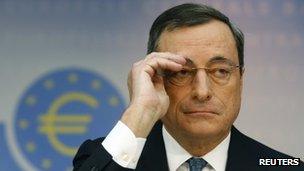Deflation ghoul hovers over eurozone
- Published
- comments

This is how the president of the European Central Bank (ECB) explained the eurozone central bank's decision to cut its policy interest rate to a smidge above nought (0.25%):
"Inflation decreased in October 2013 to 0.7%, from 1.1% in September. This decline was stronger than expected and reflected, in particular, lower food price inflation, a larger fall in energy prices and some weakening in services price inflation.
"On the basis of current futures prices for energy, annual inflation rates are expected to remain at low levels in the coming months. Underlying price pressures in the euro area are expected to remain subdued over the medium term."
Now there are a number of things to say about this.
The first (which you may already have said to yourself) is that Europe's most powerful central banker - who is supposed to know a thing or two - says energy prices are on a pronounced downward trend.
Which is not quite the message we've been getting from Centrica's British Gas, Scottish & Southern, Scottish Power and Npower.
Of course we all understand that their price rises "look backwards at the wholesale market" (as one energy boss put it to me - I am not exactly sure what that means) and include a big increment for the cost of being forced by the government to insulate homes.
But. Point the second:
The eurozone rate cut weakens the euro vis-a-vis the pound, which in turn should see lower inflation exported to the UK.
So it probably delays the moment when the Bank of England feels obliged to raise UK interest rates (to the annoyance of the gathering flock of hawks calling for rates to rise now).
Point the third:
It is not the inflation rate of 0.7% itself which the ECB sees as a worrying and dangerous thing (though that is well below the official target of just under 2%), but the pronounced downward trend in the rate - from 1.6% just four months ago.
The point is that the eurozone has only recently emerged from long and pernicious recession, and its growth remains nugatory.
If businesses and consumers began to believe that deflation was a serious prospect, they would defer purchases and investments to take advantage of falling prices - and the members of the currency union would be right back in the soup, with their economies shrinking sharply.
Worse still, there would be an even greater incentive for businesses, households and banks to reduce their debts - to save as if there's no tomorrow - because of the threat of deflation increasing the real burden of those debts.
And that would be a double whammy to spending or investing today, and thus to the recovery.
Point the fourth:
If the rate cut doesn't succeed in stimulating the economy and reviving inflation, the ECB has a bit of a problem - because there is only one interest rate cut, to zero exactly, left as ammunition in its locker.
Draghi insists he is not fretting about this, that he has different sorts of pro-inflation weapons almost to hand.
These would include charging banks an interest rate for taking their deposits, to encourage them to push money into the economy rather than parking it at the central bank.
Or the ECB could provide yet more cheap loans to banks - though it has done a good deal of this already, and hasn't stemmed the deflationary trend.
What the ECB can't do is create money in the explicit and simple way that the Bank of England and US Federal Reserve can do, through quantitative easing, because it is constitutionally prohibited from buying the sovereign debts of member states.
So if you are musing that Mr Draghi has a hand strapped behind his back in his battle against the putative demon deflation, he might not disagree.